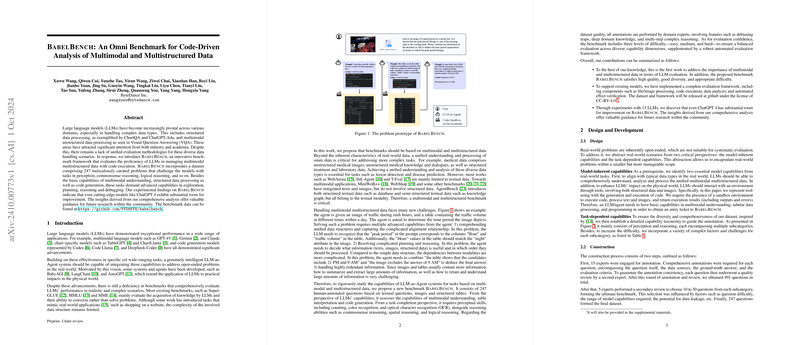BabelBench: An Omni Benchmark for Code-Driven Analysis of Multimodal and Multistructured Data
The paper "BabelBench: An Omni Benchmark for Code-Driven Analysis of Multimodal and Multistructured Data" introduces a novel benchmark designed to evaluate LLMs on their ability to process multimodal and multistructured data. This benchmark is particularly timely given the increasing application of LLMs in complex data handling, which includes structured data, multimodal unstructured data, and their integration. BabelBench aims to bridge the gap in current evaluation methodologies by providing a comprehensive framework to test LLMs on a wide array of tasks, involving both perception and reasoning.
Overview of BabelBench
BabelBench is composed of 247 expertly curated tasks, each designed to challenge LLMs in multimodal understanding, structured data interpretation, and code generation. These tasks range across diverse categories such as perception (e.g., counting, color recognition, optical character recognition) and reasoning (e.g., commonsense reasoning, logical reasoning, spatial reasoning). The difficulty levels span easy, medium, and hard, ensuring a balanced evaluation of LLM capabilities.
Experimental Setup
The BabelBench dataset was meticulously annotated by domain experts, ensuring high-quality, unbiased, and complex questions. The benchmarks cover various real-world scenarios, simulated through tasks that require advanced capabilities such as exploration, planning, reasoning, and debugging. This comprehensive approach reveals significant gaps in current LLM performance, even for state-of-the-art models like ChatGPT 4.
Key Findings
Performance Metrics: The evaluation results show that ChatGPT 4 achieves the highest accuracy at 42.11%, which indicates substantial room for improvement. Other models, including GPT-4o, Gemini-pro-1.5, and Claude3, also demonstrate below-par performance across several metrics. This underscores the complexity of the tasks posed by BabelBench and the current limitations of LLMs in handling such data-intensive challenges.
Multistructured Data Analysis: The performance of LLMs shows variability when dealing with multimodal and multistructured data. For instance, tasks involving both images and tables pose different challenges compared to those involving a single data type. This highlights the need for further research into optimizing LLMs for multimodal and multistructured data scenarios.
Task Difficulty and Capability Assessment: The experimental results indicate that LLMs perform better on easier tasks, yet they considerably struggle with medium and hard tasks. Performance also varies significantly across different capability categories, such as spatial reasoning, mathematical reasoning, counting, and OCR. This granular insight into LLM performance across different dimensions of intelligence is a significant contribution of BabelBench.
Implications and Future Directions
The research implies that current LLMs, including advanced versions like GPT-4, are not yet fully equipped to handle the intricacies of multimodal and multistructured data. From a practical standpoint, this suggests that reliance on LLMs for real-world tasks involving complex data types should be cautious and well-considered.
Practical Implications
- Application Specificity: Utilizing LLMs for tasks in domains like healthcare, finance, and traffic management, which require integration of diverse data types, remains challenging.
- Tool Interaction: Enhancing LLMs with the ability to effectively utilize external tools and align multimodal data inputs is crucial.
Theoretical Implications
- Unified Data Processing: Developing methods for more seamless integration and understanding of multimodal multistructured data.
- Advanced Reasoning: Improving the reasoning capabilities of LLMs to handle complex dependency structures and multimodal inferences.
Future Research
Future developments in AI and LLM research should focus on bridging the identified gaps:
- Enhanced Multimodal Frameworks: Design of LLMs with better alignment and interaction capabilities with diverse data types.
- Scale and Scope of Benchmarks: Expanding BabelBench to include more extensive datasets and varied real-world scenarios.
- Error Analysis and Debugging: Refining LLMs' ability to self-correct and debug based on interactions with external environments.
In conclusion, BabelBench sets a new benchmark for evaluating LLMs on multimodal and multistructured data. The insights derived from this research are critical for guiding future AI developments towards more intelligent and versatile LLM-as-Agent systems capable of addressing the diverse and complex challenges posed by real-world applications.
